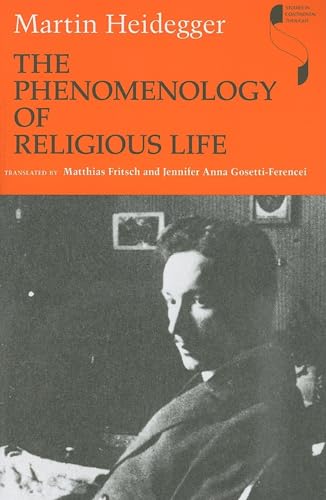Items related to The Phenomenology of Religious Life (Studies in Continental...

The Phenomenology of Religious Life presents the text of Heidegger’s important 1920–21 lectures on religion. The volume consists of the famous lecture course Introduction to the Phenomenology of Religion, a course on Augustine and Neoplatonism, and notes for a course on The Philosophical Foundations of Medieval Mysticism that was never delivered. Heidegger’s engagements with Aristotle, St. Paul, Augustine, and Luther give readers a sense of what phenomenology would come to mean in the mature expression of his thought. Heidegger reveals an impressive display of theological knowledge, protecting Christian life experience from Greek philosophy and defending Paul against Nietzsche.
"synopsis" may belong to another edition of this title.
Scrupulously prepared and eminently readable. What Heidegger undertakes here is nothing less than a phenomenological destruction of the history of religion. ―Choice
Matthias Fritsch is Associate Professor and Department Chair in Philosophy at Concordia University. He is author of The Promise Memory: History and Politics in Marx, Benjamin, and Derrida.
Jennifer Anna Gosetti-Ferencei is Associate Professor of Philosophy at Fordham University. She is author of The Ecstatic Quotidian: Phenomenological Sightings in Modern Art and Literature.
"About this title" may belong to another edition of this title.
- PublisherIndiana University Press
- Publication date2010
- ISBN 10 0253221897
- ISBN 13 9780253221896
- BindingPaperback
- Number of pages288
- Rating
Top Search Results from the AbeBooks Marketplace
The Phenomenology of Religious Life (Paperback or Softback)
Book Description Paperback or Softback. Condition: New. The Phenomenology of Religious Life 0.92. Book. Seller Inventory # BBS-9780253221896
The Phenomenology of Religious Life (Studies in Continental Thought) by Heidegger, Martin [Paperback ]
Book Description Soft Cover. Condition: new. This item is printed on demand. Seller Inventory # 9780253221896
The Phenomenology of Religious Life
Book Description paperback. Condition: New. Language: ENG. Seller Inventory # 9780253221896
The Phenomenology of Religious Life (Studies in Continental Thought)
Book Description Condition: New. Buy with confidence! Book is in new, never-used condition 0.9. Seller Inventory # bk0253221897xvz189zvxnew
The Phenomenology of Religious Life (Studies in Continental Thought)
Book Description Condition: New. New! This book is in the same immaculate condition as when it was published. Seller Inventory # 353-0253221897-new
The Phenomenology of Religious Life (Studies in Continental Thought)
Book Description Condition: New. Seller Inventory # I-9780253221896
The Phenomenology of Religious Life (Studies in Continental Thought)
Book Description Paperback. Condition: New. Brand New! This item is printed on demand. Seller Inventory # 0253221897
The Phenomenology of Religious Life
Book Description Paperback / softback. Condition: New. This item is printed on demand. New copy - Usually dispatched within 5-9 working days. Seller Inventory # C9780253221896
The Phenomenology of Religious Life (Studies in Continental Thought)
Book Description Paperback. Condition: New. BRAND NEW ** SUPER FAST SHIPPING FROM UK WAREHOUSE ** 30 DAY MONEY BACK GUARANTEE. Seller Inventory # 9780253221896-GDR
The Phenomenology of Religious Life
Book Description Paperback / softback. Condition: New. New copy - Usually dispatched within 4 working days. Heidegger's engagement with religion. Seller Inventory # B9780253221896

